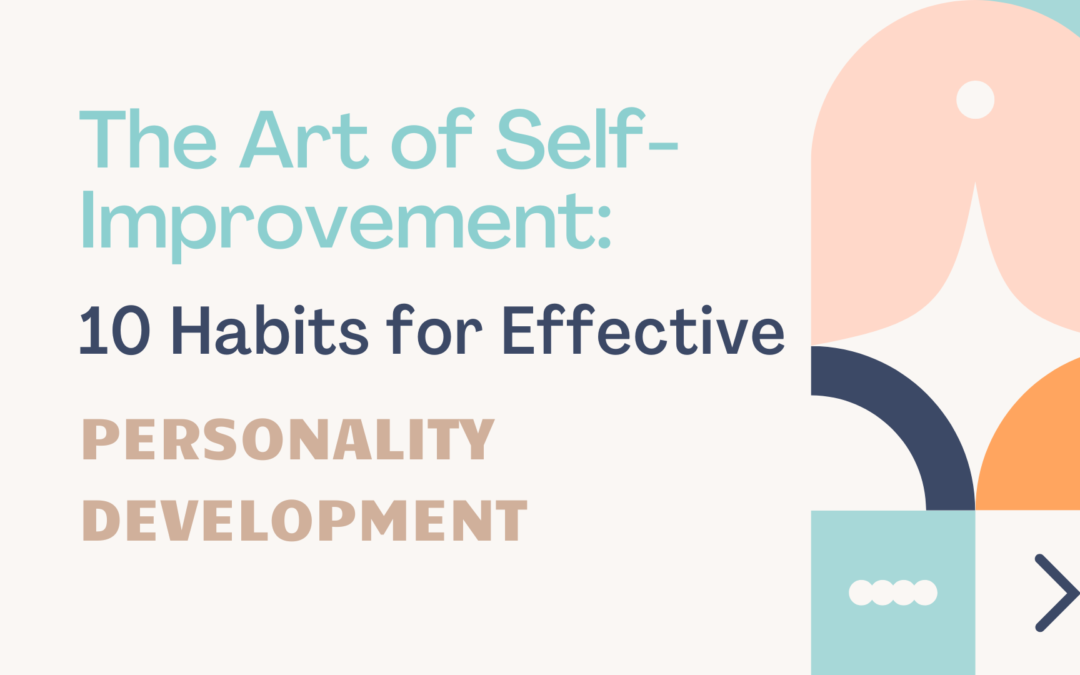Personality development plays a pivotal role in shaping our lives, influencing our interactions, decisions, and overall well-being. It involves intentional steps towards self-awareness, growth, and continual improvement. In this blog post, we will explore ten essential habits that contribute to effective personality development.
1. Cultivate Self-Awareness
Self-awareness forms the bedrock of personality development. It entails understanding one’s strengths, weaknesses, emotions, and motivations. By cultivating self-awareness, individuals can make more informed choices, build authentic relationships, and navigate challenges with greater resilience.
How to Develop Self-Awareness:
- Reflection: Regularly set aside time to introspect on your thoughts, actions, and experiences.
- Feedback: Seek constructive feedback from trusted friends, mentors, or through self-assessment tools.
- Mindfulness: Practice mindfulness techniques such as meditation or deep breathing exercises to stay grounded in the present moment.
2. Set Clear Goals
Setting clear and achievable goals provides direction and purpose in life. Goals serve as benchmarks for personal growth and success, motivating individuals to strive towards their aspirations with clarity and determination.
How to Set Effective Goals:
- specific: Clearly and specifically define your goals.
- Measurable: Establish criteria for tracking progress and success.
- Achievable: Set goals that stretch your abilities without being unrealistic.
- Relevant: Align goals with your values, aspirations, and long-term objectives.
- Time-bound: Establish deadlines to create a sense of urgency and focus.
3. Embrace Continuous Learning
Committing to lifelong learning fosters personal and professional development. It involves acquiring new knowledge, skills, and perspectives that enhance adaptability, creativity, and problem-solving abilities.
Ways to Continue Learning:
- Reading: Explore books, articles, and research papers on diverse subjects.
- Courses: Enroll in online courses, workshops, or seminars to expand your expertise.
- Networking: Engage in discussions with experts, attend conferences, or join professional groups to exchange ideas and insights.
4. Develop Emotional Intelligence
Emotional intelligence (EI) encompasses the ability to recognize, understand, and manage emotions effectively—both in oneself and others. High EI enhances interpersonal relationships, communication skills, and decision-making capabilities.
Improving Emotional Intelligence:
- Self-Awareness: Identify and acknowledge your emotions without judgment.
- Self-Regulation: Manage and express emotions appropriately in different situations.
- Empathy: Understand others’ perspectives and respond with sensitivity and compassion.
- Social Skills: Build and maintain positive relationships through effective communication and conflict resolution.
5. Enhance Communication Skills
Effective communication is fundamental to building meaningful connections and conveying ideas persuasively. It involves listening attentively, articulating thoughts clearly, and adapting communication styles to different audiences.
Tips for Better Communication:
- Active Listening: Focus on understanding others’ viewpoints before formulating responses.
- Clarity: Express thoughts concisely and avoid ambiguity or jargon.
- Nonverbal Cues: Pay attention to body language, gestures, and facial expressions to enhance communication.
- Feedback: Solicit feedback to improve communication skills and ensure messages are received as intended.
6. Build Resilience
Resilience enables individuals to bounce back from adversity, setbacks, or challenges. It involves maintaining a positive outlook, adapting to change, and leveraging strengths to overcome obstacles.
Building Resilience:
- Positive Mindset: Cultivate optimism and view setbacks as opportunities for growth.
- Problem-Solving Skills: Develop strategies to address challenges effectively and learn from experiences.
- Support System: Seek encouragement and guidance from friends, family, or mentors during difficult times.
- Self-Care: Prioritize physical and mental well-being through healthy habits, relaxation techniques, and stress management strategies.
7. Practice Self-Discipline
Self-discipline entails the ability to control impulses, maintain focus, and persevere towards goals despite distractions or temptations. It fosters consistency, productivity, and personal integrity.
How to Enhance Self-Discipline:
- Goal Setting: Establish clear objectives and prioritize tasks based on importance and urgency.
- Time Management: Allocate time effectively for tasks, breaks, and leisure activities.
- Healthy Habits: Adopt routines that promote physical health, mental clarity, and emotional balance.
- Accountability: Hold yourself accountable for commitments and seek support from peers or mentors to stay motivated.
8. Foster Positive Relationships
Building and nurturing positive relationships contribute to emotional well-being, personal growth, and professional success. It involves mutual respect, trust, effective communication, and support during both triumphs and challenges.
Cultivating Positive Relationships:
- Authenticity: Be genuine and sincere in interactions with others.
- Empathy: Demonstrate understanding and compassion towards others’ feelings and experiences.
- Communication: Listen actively, express appreciation, and resolve conflicts constructively.
- Boundaries: Establish clear boundaries to maintain healthy relationships and mutual respect.
9. Maintain Physical and Mental Health
Physical and mental health are integral components of personality development and overall well-being. Prioritizing self-care through exercise, nutrition, sleep, and stress management enhances energy levels, cognitive function, and emotional resilience.
Tips for a Healthy Lifestyle:
- Exercise: Engage in regular physical activity to improve cardiovascular health, strength, and endurance.
- Nutrition: Maintain a balanced diet rich in vitamins, minerals, and nutrients to support overall health and vitality.
- Sleep: Aim for adequate restorative sleep to enhance mood, concentration, and immune function.
- Stress Management: Practice relaxation techniques, mindfulness, or hobbies that promote relaxation and alleviate stress.
10. Stay Adaptable
Adaptability involves embracing change, learning from experiences, and adjusting to new circumstances or environments effectively. It enables individuals to navigate uncertainty, seize opportunities, and thrive in diverse personal and professional settings.
Becoming More Adaptable:
- Open-mindedness: Embrace new ideas, perspectives, and approaches to problem-solving.
- Flexibility: Adjust plans and expectations based on evolving circumstances or feedback.
- Resilience: Maintain a positive attitude and learn from setbacks or challenges to grow stronger.
- Continuous Learning: Stay curious, seek opportunities for skill development, and remain proactive in acquiring new knowledge and competencies.
Conclusion
In conclusion, effective personality development is a journey of self-discovery, growth, and continuous improvement. By incorporating these ten habits into your daily routine, you can cultivate resilience, enhance communication skills, foster positive relationships, and maintain overall well-being. Remember, the art of self-improvement requires commitment, self-awareness, and a willingness to embrace change. Start implementing these habits today, and witness how they contribute to your personal and professional success.

